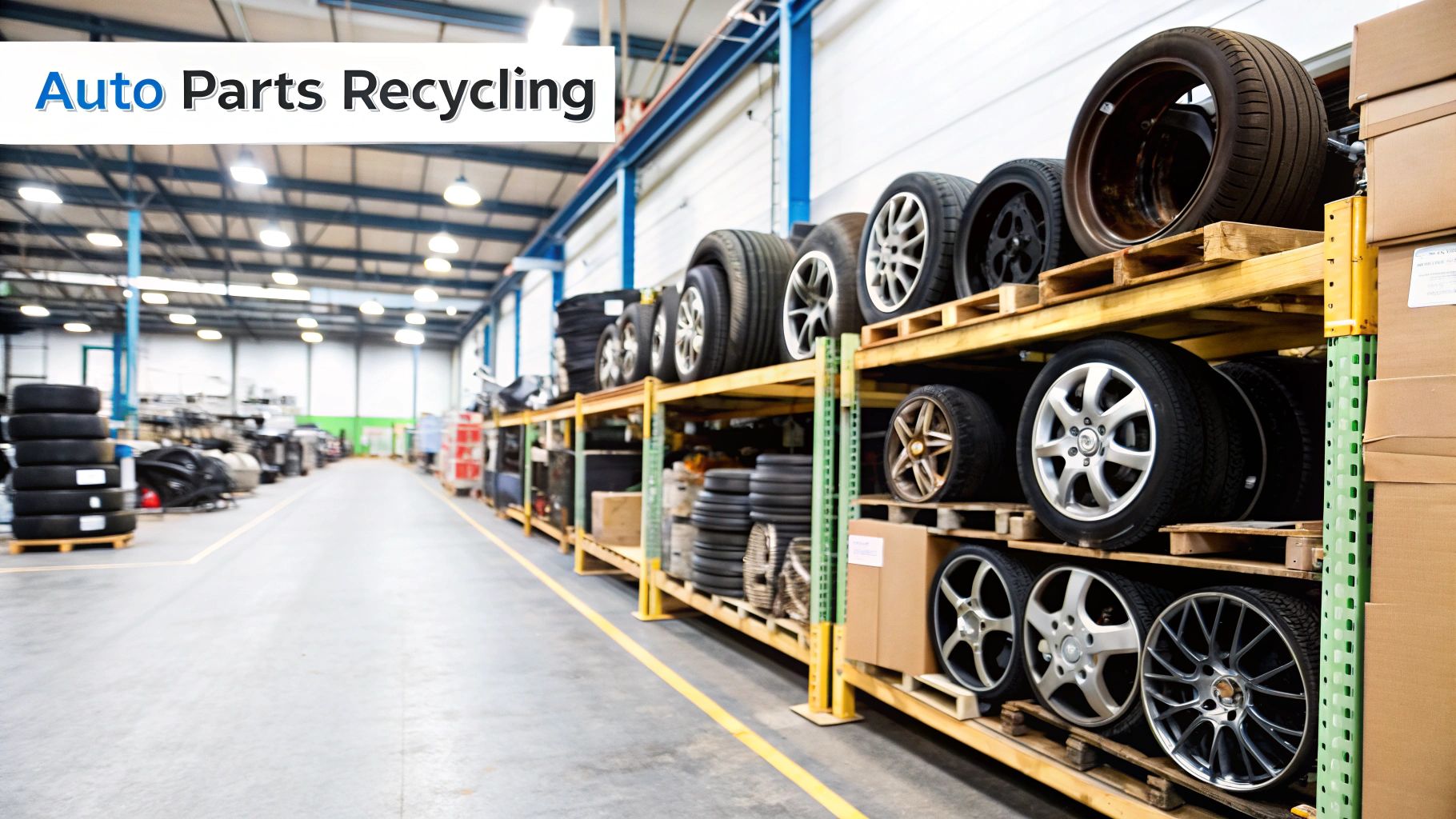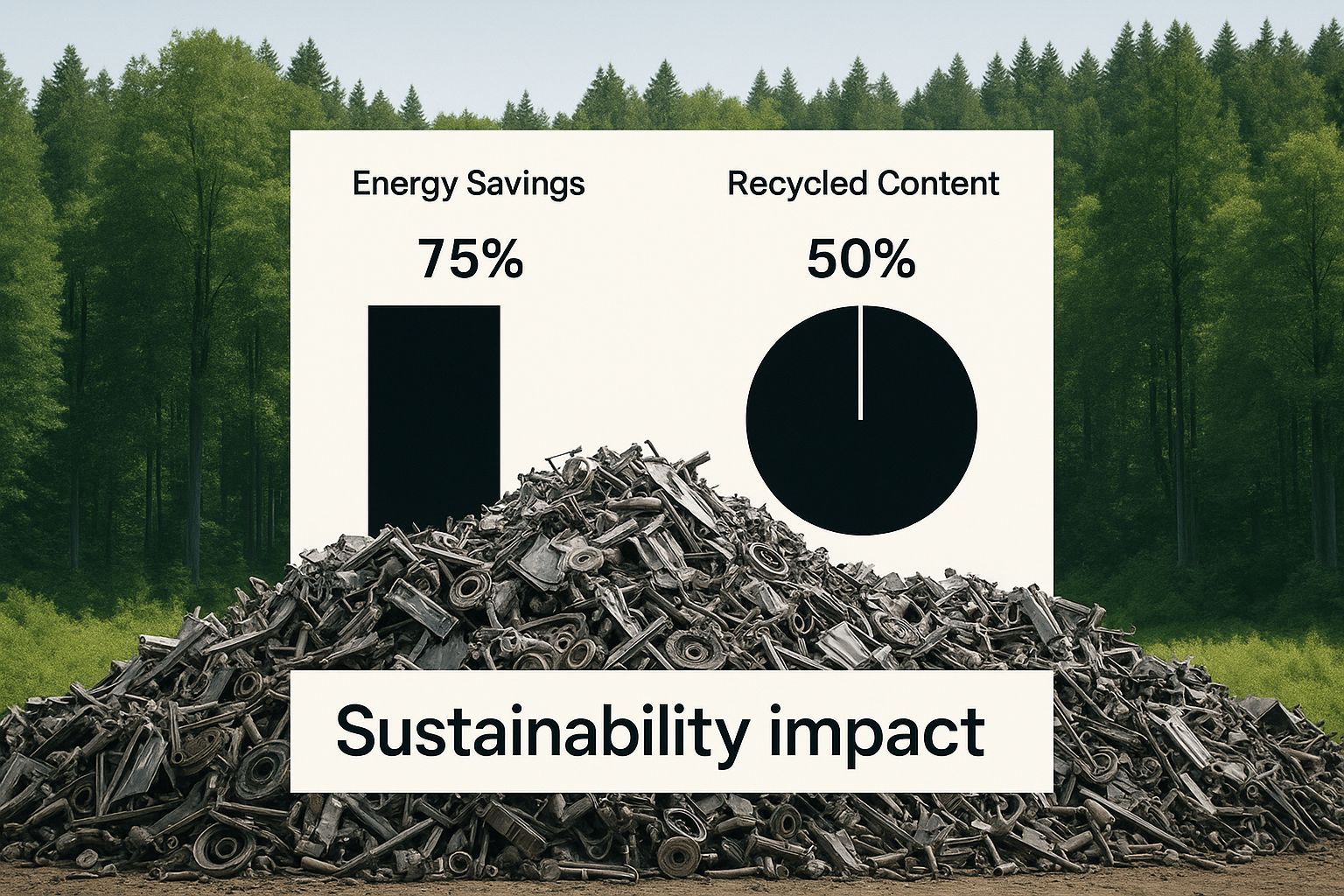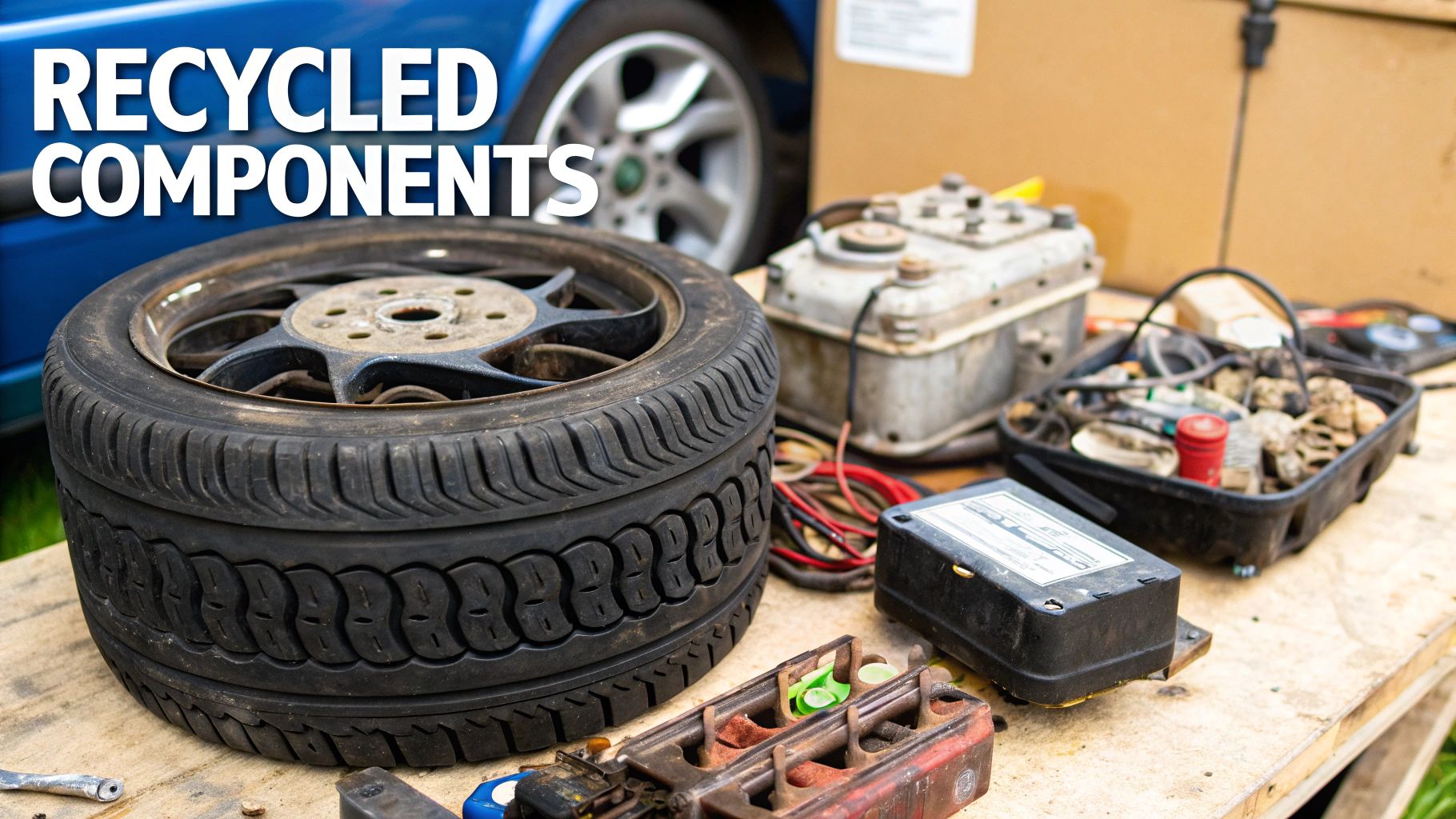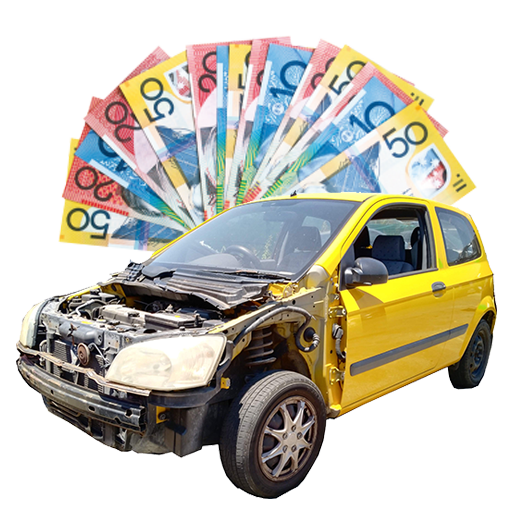That old car sitting in your driveway isn't just an eyesore—it's a goldmine of materials waiting for a second life. We’re talking about auto parts recycling, which is really just the smart process of taking retired vehicles apart to rescue perfectly good components and reclaim raw materials like steel, aluminium, and plastic. It’s a simple move that turns a headache into a win for both your wallet and the environment.
Unlock the Hidden Value in Your Old Car

It’s easy to look at a car that won't start and see nothing but a problem. But it's time to shift that mindset. Think of your old car as an asset, a compact stockpile of materials that are desperately needed in Australia’s growing circular economy.
When you decide to recycle it, you're doing more than just clearing space. You're plugging into a powerful system that keeps our natural resources in the ground and our landfills from overflowing.
The Scale of Automotive Waste
The number of cars hitting the end of the road is staggering. Every year in Australia, roughly 850,000 motor vehicles are retired, creating about 1.36 million tonnes of waste. Shockingly, the industry currently only manages to recover around 70% of all that material, with the rest getting buried in the ground. You can read more about driving change in automotive recycling on fcai.com.au.
That gap represents a massive opportunity. By choosing to recycle your old car, you’re helping to close that loop. Your one vehicle becomes part of a much larger effort to build a more sustainable future, piece by piece.
The best part of recycling your car isn’t just the cash you get for it. It’s the satisfaction of knowing that almost every part, from the steel chassis to the heavy engine block, will be given a new purpose, drastically cutting down the need for new mining and manufacturing.
Once you see the real environmental and financial upside, getting rid of an old car feels less like a chore and more like a smart, rewarding decision. Now you’re ready to take the next steps and turn that hunk of metal into cash.
Figuring Out What Your Car is Really Worth
Before you even think about picking up the phone, it pays to know what parts of your car are actually valuable. You don't need to be a qualified mechanic to do a quick once-over, and honestly, a little bit of knowledge here can make a huge difference to your final payout. Some components are always in demand for auto parts recycling, either because of the precious metals inside them or because they can be refurbished and live another day.
Think of it this way: your old car is much more than just a pile of scrap metal. The big-ticket items—the engine, transmission, and catalytic converter—are what really drive up its value. If the engine still turns over or the transmission is in decent nick, your car is suddenly a lot more appealing to a recycler than one that’s been collecting rust for a decade.
The environmental impact is pretty significant too. When these parts are recovered, it's a big win for sustainability.

As you can see, pulling these materials out of old vehicles and putting them back into circulation means we don't have to dig as much out of the ground. It's a simple, effective way to conserve our natural resources.
The Recycler's Wish List
It's not just about the major mechanical parts, though. Smaller bits and pieces definitely add up. Things like alternators, starter motors, and the car's computer (the ECU) are consistently on the wanted list. Even a set of alloy wheels can add a nice little bump to the price, particularly if they aren't too banged up.
But the real treasure is often the catalytic converter. This unassuming part of your exhaust system is packed with rare metals like platinum, palladium, and rhodium. These metals are worth a fortune on the commodities market, and just this one component can easily add hundreds of dollars to your quote.
When you know the condition of these key parts, you're in a much stronger position to negotiate. Being able to clearly list what’s still good in your vehicle gives you the confidence to push for the best possible cash offer.
If you want to get really granular on this, our ultimate guide to scrapping a car in Australia goes into even more detail on squeezing every last dollar out of your old ride.
To help you get started, I've put together a quick table that breaks down some of the most common parts recyclers look for and what makes them so valuable.
Valuable Auto Parts to Identify for Recycling
| Part Category | Specific Components | Typical Value Driver |
|---|---|---|
| Drivetrain | Engine, Transmission, Axles | High demand for reconditioning and reuse in other vehicles. |
| Exhaust System | Catalytic Converter | Contains precious metals (platinum, rhodium) with high scrap value. |
| Electronics | ECU, Alternator, Starter Motor | Can be refurbished or stripped for valuable internal components. |
| Body & Wheels | Alloy Wheels, Body Panels | Recycled for aluminium content or resold if in good condition. |
Having a mental checklist of these items before you call for a quote is one of the smartest things you can do. It shows you've done your homework and helps ensure you get a fair price based on what your car is truly worth.
Getting Your Car Ready for a Smooth Handover
A bit of prep work before the tow truck rolls up can make all the difference between a quick, easy handover and a last-minute scramble. Taking a few simple steps ensures the whole auto parts recycling process goes off without a hitch and you get the exact cash amount you were quoted.
Paperwork and Personal Items
First things first, get your documents in order. You’ll need to have proof that you own the car—usually the vehicle's registration papers—and a valid photo ID like a driver's licence. This isn't just a suggestion; it's a legal requirement for any reputable car removal service. Having these ready to go means no frustrating delays when our team arrives.
Next, it’s time to give the car one last clean-out. I can't tell you how many times people have called back after their car is gone, looking for lost items. Check everywhere: the glove box, under the seats, in the centre console, and especially the boot. You might find anything from old CDs and sunglasses to important receipts you thought were long gone.
What You Don't Need to Do
Here’s a common question we get: "Should I drain the fluids?" The answer is a firm no.
Please leave the oil, coolant, and any leftover petrol right where they are. Our team has the proper equipment and training to handle these hazardous materials safely and according to environmental regulations. Trying to do it yourself can be messy, dangerous, and isn't necessary.
The single most important thing you can do is be honest about your car's condition from the get-go. When you call for a quote, a clear, upfront description of what’s working and what’s broken ensures the price we offer is the price you get paid. No surprises for anyone.
Being transparent about your vehicle's state helps us give you an accurate valuation right from the start. For a deeper dive into getting your vehicle ready, check out our guide on how to dispose of a car in Adelaide. A few minutes of prep work really does make the entire process seamless.
So, How Are Scrap Car Prices Actually Calculated in Australia?
Ever been puzzled by how one car wrecker offers you a few hundred dollars for your old banger, while another quotes a figure that seems way more generous? It’s not just a random number they pull out of thin air. The price you're offered for your scrap car is actually a careful calculation, grounded in the realities of the Australian auto parts recycling market.
Getting a handle on these factors will help you know what a fair offer looks like. It all starts with the basics: your car's make, model, age, and its current condition. It just makes sense that a newer model packed with in-demand parts is going to be worth more than a common, older car that’s been rusting away for years.
What Really Drives the Value of Your Old Car
At the most fundamental level, the daily market price for scrap metal—especially steel and aluminium—sets a baseline for your car’s value. Think of it like any other commodity; it goes up and down. When metal prices are strong, the sheer weight of your car makes it more valuable. But honestly, the real potential for a higher payout usually comes from the parts that can be salvaged and reused.
Here's what a professional buyer is really looking at:
- Is it a Runner? A car that can still start and run, even if it's rough, is worth a lot more. Why? Because it suggests the engine, transmission, and other key mechanical parts are likely still good.
- Is it all there? A complete vehicle, with all its bits and pieces still attached, is far more appealing than a stripped-out shell. It’s a complete package for a recycler.
- What's Inside? Certain components are goldmines. Things like catalytic converters, which contain precious metals, can seriously bump up the price you’re offered.
Here's a way to think about it: A recycler sees your car in two ways. First, as a lump sum of metal weight. Second, and often where the real money is, as a collection of individual parts they can harvest and sell. To figure that second part out, they need the whole car to assess.
This is exactly why a car that still runs can fetch thousands more than one that’s just a rusted frame.
In Australia, the value of a scrap car can range anywhere from AUD 300 to a surprising AUD 9,000. A non-runner at the bottom end might only get you AUD 300 to AUD 800. But a vehicle with a solid, working engine could push you towards that AUD 9,000 figure. To get a better sense of this, you can learn more about how much wreckers pay for cars and see what truly sways their final offer.
That massive price range is precisely why giving an honest and detailed description of your car is so important. It lets a buyer give you a truly accurate quote based on its real potential, whether it's destined for the crusher or to give another car a new lease on life with its parts.
Why Professional Car Removal Is the Smart Move
It can be tempting to get your hands dirty and try to dismantle an old car yourself, hoping to make a few extra bucks from the parts. While I admire the DIY spirit, when it comes to old vehicles, calling in the pros for auto parts recycling is almost always the smarter, safer, and more profitable choice.
A specialist car removal service like Auto Removal Adelaide has the gear and expertise to deal with the nasty stuff hiding under the bonnet. We're talking about safely handling corrosive battery acid, old engine oil, antifreeze, and other fluids. Without the right equipment, these substances can easily end up contaminating the ground and our local waterways.

Protecting the Environment and Your Peace of Mind
Getting a car ready for recycling is a lot more involved than just grabbing a spanner. Before a single part is removed, professional recyclers have a strict depollution process. This is a critical step where all the toxic fluids are carefully drained and contained, preventing any environmental harm right from the start.
So, choosing a professional service isn't just about convenience; it's about making a responsible decision that helps keep our environment healthy. It ensures every last usable component gets a second life and every hazardous material is disposed of correctly, which is a massive win for the circular economy.
By going with a professional service, you can be confident your old vehicle is being handled in the most eco-friendly way. You avoid all the risks and mess of a DIY teardown and still get paid for your car’s value.
The numbers really tell the story. Australia’s auto recycling industry processes nearly 500,000 vehicles every year, but we've got some catching up to do. Right now, only about 75% of these cars are properly recycled, which lags behind the United States' impressive 95% rate. This just goes to show how crucial professional services are in making sure more materials are recovered and less goes to waste. If you're keen to learn more, you can discover more insights about Australia's environmental future and see why efficient recycling matters so much.
At the end of the day, using a professional team means you get a fair price for your vehicle without any of the headaches, all while doing your bit for the planet.
Common Questions About Auto Parts Recycling
When you're ready to say goodbye to an old car and get it recycled, a few questions naturally pop up. Getting the right answers makes the whole process smoother and ensures you know what’s happening every step of the way. Here are the things we get asked most often by car owners in Adelaide.
What Paperwork Do I Need to Scrap My Car?
This is a big one, and it's all about proving you own the car. You'll definitely need a valid photo ID, like your driver's licence, and the vehicle's registration papers.
In Australia, this isn't just company policy—it's the law. It’s a crucial step to stop stolen vehicles from entering the scrap trade. Any reputable car removal service will insist on seeing this documentation to make sure the transfer is above board.
Will I Get More Money If I Pull the Parts Myself?
It’s tempting to think you can make a few extra dollars by stripping the car down, but for most people, it actually works out to be the opposite. Selling individual parts takes time, specialised tools, and a good bit of mechanical know-how.
More to the point, we base our offer on the value of the complete vehicle. A car that’s been picked apart is worth far less because it’s missing the valuable components we look for. For most owners, the hassle-free process and better price of selling the car whole just makes more sense.
The real value for a recycler comes from seeing the car as a complete unit. This lets us properly assess which parts can be salvaged and what the total scrap metal weight is, which is how we give you the best possible price.
How Is My Car's Scrap Value Calculated?
There's no single magic number; the final price we offer is based on a few key things. We look at a combination of factors to work out what your car is truly worth.
- The Basics: The make, model, age, and general condition of the vehicle.
- Market Rates: The current price for scrap metals like steel and aluminium can fluctuate, which impacts the value.
- Key Components: The presence of high-value parts we can salvage, like the engine, transmission, and catalytic converter.
A complete car, especially one that still runs, will always be worth more because its parts have a much higher chance of being reused. That's why giving us an honest description of its condition helps us give you our most accurate and competitive quote.
Ready to turn that old car into instant cash without the drama? The team at Auto Removal Adelaide offers top dollar for unwanted vehicles across the region, and we even include free towing. Get your no-obligation quote by visiting us at https://autoremovaladelaide.com.au.


